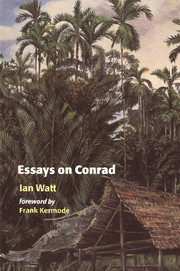Book contents
- Frontmatter
- Contents
- Foreword
- Acknowledgements
- Chapter 1 Joseph Conrad: alienation and commitment
- Chapter 2 Almayer's Folly: introduction
- Chapter 3 Conrad criticism and The Nigger of the ‘Narcissus’
- Chapter 4 Conrad's Heart of Darkness and the critics
- Chapter 5 Comedy and humour in Typhoon
- Chapter 6 The political and social background of The Secret Agent
- Chapter 7 ‘The Secret Sharer’: introduction
- Chapter 8 Conrad, James and Chance
- Chapter 9 Story and idea in Conrad's The Shadow-Line
- Chapter 10 The decline of the decline: notes on Conrad's reputation
- Chapter 11 Around Conrad's grave in the Canterbury cemetery – a retrospect
- Chapter 12 ‘The Bridge over the River Kwai’ as myth
- Index
Chapter 8 - Conrad, James and Chance
Published online by Cambridge University Press: 22 September 2009
- Frontmatter
- Contents
- Foreword
- Acknowledgements
- Chapter 1 Joseph Conrad: alienation and commitment
- Chapter 2 Almayer's Folly: introduction
- Chapter 3 Conrad criticism and The Nigger of the ‘Narcissus’
- Chapter 4 Conrad's Heart of Darkness and the critics
- Chapter 5 Comedy and humour in Typhoon
- Chapter 6 The political and social background of The Secret Agent
- Chapter 7 ‘The Secret Sharer’: introduction
- Chapter 8 Conrad, James and Chance
- Chapter 9 Story and idea in Conrad's The Shadow-Line
- Chapter 10 The decline of the decline: notes on Conrad's reputation
- Chapter 11 Around Conrad's grave in the Canterbury cemetery – a retrospect
- Chapter 12 ‘The Bridge over the River Kwai’ as myth
- Index
Summary
‘Think what English literature would be like without Conrad and James … There would be nothing!’ Thus Ford Madox Ford; and we must at least agree that there would be markedly less. The roles of Conrad and James in the English tradition of fiction are parallel in many respects; aliens themselves, they brought, and mainly from France, a view of the novel form at once broader as regards subject-matter and more self-conscious as regards form, than had been current in Victorian England; and in so doing they became the recognized, perhaps the supreme, masters of what we are still calling the modern novel. When one further considers that James and Conrad knew each other fairly well for nearly twenty years, one anticipates a relationship of quite exceptional human and literary interest. Actually, though certainly not lacking an appropriately ironic complexity, the relationship is above all elusive and obscure.
This is mainly for simple lack of evidence. Conrad habitually destroyed his letters; James burned most of his papers before his death: and less than a dozen letters survive from what must have been a fairly large correspondence. Even so, there was probably a good deal of ambiguity in the relationship itself.
Conrad read and admired James rather early, while he was still at sea. Once he had decided to become a professional writer, and his second novel, An Outcast of the Islands, came out, he thought of sending it to James; but it was very difficult to pluck up courage.
- Type
- Chapter
- Information
- Essays on Conrad , pp. 133 - 151Publisher: Cambridge University PressPrint publication year: 2000



